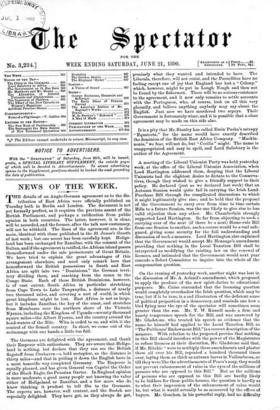On the evening of yesterday week, another night was lost
in the discussion of Mr. A. Acland's amendment, which proposed to apply the produce of the new spirit-duties to educational purposes. Mr. Caine contended that the licensing question would completely overshadow the Irish question, which may be true, but if it be true, is a sad illustration of the deficient sense of political proportion in a democracy, and reminds one how a bird flying near the eye of the spectator will sometimes seem greater than the sun. Mr. T. W. Russell made a firm and hearty temperance speech for the Bill, and was answered by Mr. Gladstone, who treated his speech as evidence that the name he himself had applied to the Local Taxation Bill, as " The Publicans' Endowment Bill," is a correct description of the measure. With relation to the proposed proviso that nothing in this Bill should interfere with the power of the Magistrates to refuse licences at their discretion, Mr. Gladstone said that, if Mr. Ritchie " were to multiply these amendments and plaster them all over his Bill, repeated a hundred thousand times over, laying them as thick as autumn leaves in Vallombrosa, or till they were like the advertisements of Pears's soap, they would not prevent enhancement of value in the eyes of the millions of persons who are opposed to this Bill." But as the millions of persons who are opposed to this Bill are hardly likely to be bidders for these public-houses, the question is hardly as to what their impression of the enhancement of value would be, but what it would actually be as measured by the offers of buyers. Mr. Gosehen, in his powerful reply, had no difficulty
at all in proving to demonstration that Mr. Gladstone's own speeches are at least as responsible for these enhancements of value as those of any other statesman, and far more re- sponsible than the present Bill. Mr. Gladstone had used both the phrase " vested interest," and the still stronger phrase "legislative title," of the publican's right in the licence. Yet now he loftily denounces a Bill which will diminish the existing number of licences, and prevent the grant of new licences, as if it were a flagrant violation of the principles which he had himself supported.



































 Previous page
Previous page